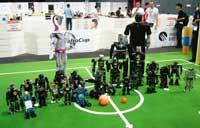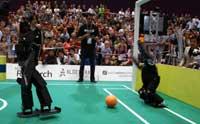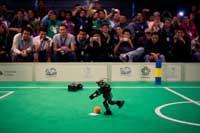Are robots the most skilled footballers?

The announcement that in 2050 we will meet the autonomous robots that will defeat the football stars has been made by Professor Claude Sammut of the University of New South Wales in Australia.
It is difficult to make concrete temporal forecasts, but there are also those who believe their words. In fact, Sammute knows closely the steps being taken in the field of robotics, and was one of the participants who were developing the project called Grupo Popular Cup.
Well, the international soccer tournament of the robots is known as Peña Cup. It is born with the aim of promoting and promoting research in Artificial Intelligence, offering researchers working in it the capacity and the appropriate environment to form. It is a question of developing a suitable instrument for decision-making and the practice of physical environment. Football is, in some way, the one that offers a playful vision to this challenge.
“For those who are developing artificial intelligence and robotic technology, football is very useful,” says Sammore. Football requires the robot to know its surroundings and build with sensors a model that surrounds it. Subsequently, he uses this information to argue it and make timely decisions.” On the other hand, the sport demands communication and collaboration between players, as well as the development of learning skills to look for the most appropriate tactics to face their rivals.

In any case, the SpaceCup and the like project also serve to make robots work their skills in the future in other fields: work and dangerous environments, rescue, development of doll robots for play and education or improvement of work in industrial robots.
Background in chess
It is difficult to imagine many people skillfully playing a whole group of human robots. Sammore, however, wanted to reinforce his ad through an example.
He recalled that in 1968 John McCarthy and Donald Michie made a bet to David Levy, Scottish chess champion, to develop a computer program capable of defeating him in less than ten years. “It took a little longer, but currently there are programs of this type. With a similar spirit or motivation, Cup will keep its challenge. By 2050 we will have a group of totally autonomous robots. He will be able to win the best players in the world.”

To achieve this challenge, “robots must be able to feel and act also in zones without structures,” he added. This represents a great advance in perception, decision-making, learning and cooperative attitude. Sammore says that robots have the greatest difficulties in learning to control the ball and avoid obstacles.
“Let’s not forget that robots have hardware and software systems. We will also have to advance in sensors, actuators and storage of energy and materials.” However, Sammut is also convinced that they have started the path and that they will soon become “better than the real footballers”. Will we see it?
Published in Ortzadar.
Buletina
Bidali zure helbide elektronikoa eta jaso asteroko buletina zure sarrera-ontzian











